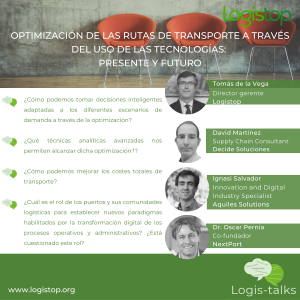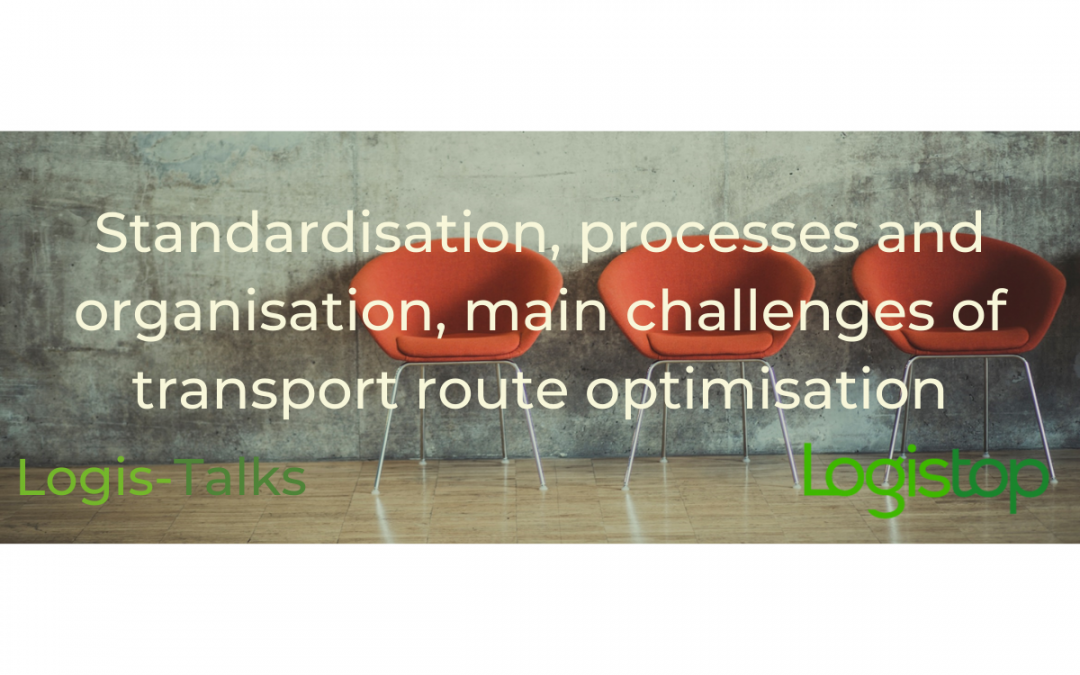- Recruiting and retaining talent, as well as training staff, is also seen as a challenge.
- Route optimisation can improve efficiency and reduce costs without losing quality of service.
- Identifying the optimal mix for optimal cost is key in freight planning.
In Logis-Talks “Optimisation of transport routes through the use of technologies: present and future” we have analysed and discussed how the application of new technologies to the logistics sector has allowed to experience significant changes and advantages that have led to increased competitiveness and productivity, as well as a more efficient use of all available resources.
To analyse these issues, we had the participation of David Martínez, Supply Chain Consultant, Decide Soluciones, Ignasi Salvador, Innovation and Digital Industry Specialist, Aquiles Solutions, and Óscar Pernia, co-founder, NextPort, as well as the presentation and moderation of Tomás de la Vega, Managing Director, Logistop.

Application of artificial intelligence in route optimisation
David Martínez, in his speech, explained the existing optimisation possibilities when it comes to optimising transport routes and the benefits of their implementation. The objective of the application of AI should be to achieve efficiency and cost reduction, without reducing the quality of the service offered to customers.
David also pointed out that the application of route optimisation tools based on artificial intelligence will allow a reduction of between 3% and 8% in operating costs, a 20% reduction in CO2 emissions, as well as a 15% reduction in times.
“Not all companies are prepared for all existing planning levels, so it is necessary to find the level that best suits each client in order to improve efficiency and reduce costs without losing quality of service.”
David Martínez, Supply Chain Consultant, Decide Soluciones
Coupled optimisation of freight and routes to improve the total cost of the operation
Ignasi Salvador then explained some examples of projects they have developed related to freight and route optimisation. Nowadays, there are many opportunities for optimisation, which is why, depending on the needs and problems of each client, the most appropriate optimisation for each specific case must be analysed and applied.
As Ignasi points out, in many of the cases that must be faced, we are faced with the existing problem of who decides how to organise the goods in the truck and what criteria must be followed to make these decisions.
“Depending on the needs and problems of each client, the most appropriate optimisation must be analysed and applied for each specific case.”
Ignasi Salvador, Innovation and Digital Industry Specialist, Aquiles Solutions
Smartports, digital twins and artificial intelligence
For his part, Óscar Pernía provided insight into the optimisation of cargo routes from a port logistics point of view through the development of a product for SmartPort that fuses digital twin and artificial intelligence technologies. The product in question will enable digital infrastructure to transform decision making, based on a data platform that will provide useful data that will enable data analytics and prediction, as well as prescriptive simulation.
This will enable, among other benefits, the reduction of transit times for cargo, digital asset management, compliance with environmental regulations, transparency and collaboration between the actors involved in the chain, as well as the generation of added value for customers through a culture of continuous improvement.
“Efficiency, safety, sustainability, continuous improvement… are some of the benefits and added value expected in Ports – but the key to success remains in the re-engineering of processes and increasingly the ability to put in value the data that articulates our interactions in the logistics chain.”
Óscar Pernia, co-founder, NextPort
Present and future of transport route optimisation through the use of technology
At the end of the speeches, a round table discussion moderated by Tomás de la Vega took place to analyse different issues related to the present and future of the optimisation of transport routes.
One of the topics discussed was the need to re-engineer processes in order to further optimise the reduction of operating costs and times. In this sense, as Ignasi Salvador, Innovation and Digital Industry Specialist, Aquiles Solutions,
points out, nowadays, if companies were to consider how to carry out many of their processes and start from scratch, they would probably approach them in a completely different way, partly due to the existing capacity to plan all processes globally.
For this reason, and following this line, when establishing an optimisation model for a specific client, as David, David Martínez, Supply Chain Consultant, Decide Soluciones, comments, it is a question of adapting the different improvement systems based on transversal data for the entire industry to the specific needs and problems of each client.
Another of the challenges that must be faced today is the attraction and retention of talent, as well as the training of the workforce linked to the implementation of new solutions and technologies. As Óscar Pernia, co-founder, NextPort, points out, it is necessary to introduce new profiles that are more analytical and that, for example, complement the figure of the planner, as well as to evolve towards continuous improvement processes. New skills such as Data Science will be key to use/maintain data and configure algorithms.
Finally, it was highlighted how the percentage of Spanish companies that are still applying optimisation processes in their logistics chain is still lower than the numbers we should be at. And, in order to boost efficiency within the sector, more emphasis should be placed on showing the benefits of applying these processes, highlighting the added value that can be obtained by improving efficiency and that not only reduces costs and time, but also makes it possible to make certain deliveries that otherwise could not be carried out or compromise delivery dates, among other things.
About Logistop
Logistop is the benchmark workspace for collective innovation through the realisation of projects hand in hand with our members. Transforming the entire supply chain into a more efficient and sustainable one. All this with the aim of articulating and carrying out innovation projects among the members, without excluding the possibility of collaborating with or receiving support from certain organisations outside Logistop.

